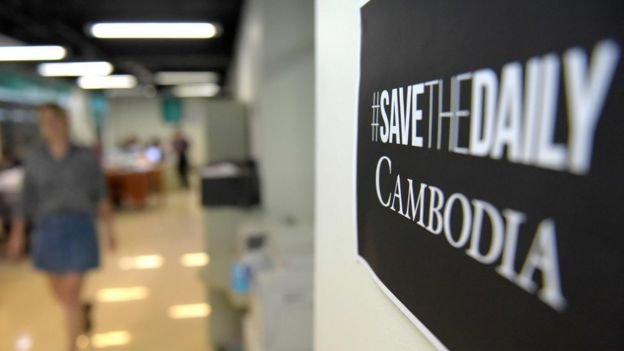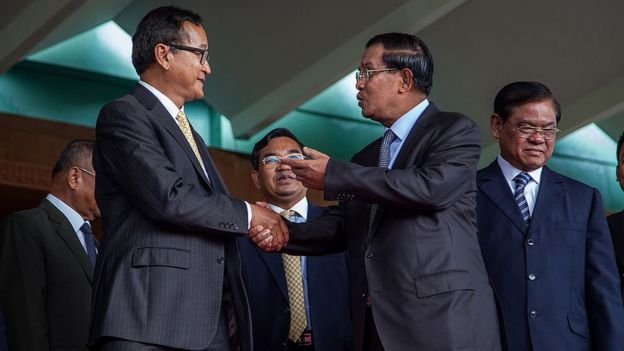
As of not long ago, video blogger Catherine Harry was a Facebook example of overcoming adversity in Cambodia. Her page, A Dose of Cath, included a progression of frank first individual recordings on forbidden subjects like virginity and monthly cycle that never got broadcast appointment on TV.
At that point, on 19 October, Facebook changed its News Feed in Cambodia and five other little nations. Rather than seeing posts from Facebook pages in their general News Feed, clients in the test needed to go to another segment called Explore Feed to see the substance. Thus when Ms Harry posted another video on Facebook on Saturday, only 2,000 of her fans saw it in the primary hour, contrasted with around 12,000 who typically viewed.
"Abruptly I understood, stunning, they really hold so much power," she said. Facebook "can pound us simply like that in the event that they need to".
Ms Harry, who quit her business to concentrate on vlogging, isn't recently stressed over her employment. Cambodia is in the throes of its most serious government crackdown in years in front of a national race next July that could test the strength of Prime Minister Hun Sen, one of the longest-serving heads of government on the planet.
The crackdown has just asserted two NGOs, more than twelve radio stations, and the nearby workplaces of two autonomous media outlets, Radio Free Asia and The Cambodia Daily. Hun Sen's fundamental resistance, the Cambodian National Rescue Party (CNRP), could be broken down completely at a Supreme Court hearing on 16 November.
"Out of the considerable number of nations on the planet, why Cambodia?" Ms Harry asks of Facebook's analysis. "This couldn't have come at a more regrettable time."
Restriction pioneer: 'I don't feel safe in Cambodia'
Facebook's News Feed try alarms distributers
Facebook outperformed TV as Cambodians' most prevalent wellspring of news a year ago, as per a review from the Asia Foundation, with generally 50% of respondents saying they utilized the web-based social networking system.
The stage helped control the CNRP's increases against the overseeing Cambodian People's Party (CPP) in the 2013 national decisions and has been one of the main spots for disagree in a nation positioned 132nd out of 180 nations in Reporters Without Borders' 2017 World Press Freedom Index.
With most standard conventional media lined up with the CPP, Facebook's test could imply that local people just get a skewed variant of the day's news, said Von Vorn, a 30-year-old tuk-tuk driver.
"It resembles a frog in a lake," he said. "In the event that the frog is in the lake, it won't know anything about the world - simply the lake."

Facebook's fame has not been lost on Hun Sen, who has amassed right around nine million adherents with a blend of shoreline selfies, state news and singing challenges, and whose page was positioned by worldwide advertising firm Burson-Marsteller as the eighth most prominent of any world pioneer.
Hun Sen's long-term match, Sam Rainsy, the ousted previous leader of the CNRP who runs his very own famous page, said his movement had plunged 20% since the begin of the Facebook test. Not at all like the head administrator, whom he blamed for purchasing Facebook supporters from outside "snap ranches", Mr Rainsy said he couldn't pay to support his presents on place them before more clients in their standard News Feeds.
"Facebook's most recent activity would perhaps give a much more grounded aggressive edge to tyrant and degenerate government officials," he said.
Cambodia PM advises pundits to pay up, or pack up
Hun Sen denies purchasing Facebook likes
Cambodia's wily pioneer
Facebook did not react to quick demands for input. In any case, in a blog entry a week ago, Adam Mosseri, the stage's head of News Feed, said the progressions were made "to comprehend if individuals like to have isolate places for individual and open substance". The stage had no plans to extend the test internationally, he said.
Cambodian distributers of all stripes said they were disappointed by the unannounced changes.
Leang Phannara, web editorial manager for Post Khmer, the Khmer-dialect form of free English every day the Phnom Penh Post, said Khmer Facebook posts were contacting 45% less individuals, while web activity was down 35%. The best way to recover that crowd was to pay to support posts, he said.
"It's a compensation to-play situation," Mr Phannara said.

Lim Cheavutha, CEO of the stridently ace government online outlet Fresh News, was annoyed with transforms he said had eaten into his activity, however he didn't have numbers to hand.
"I completely don't bolster this new [Facebook] strategy," he said. "It influences my organization, as well as every single other medium."
Neighborhood non-administrative associations (NGOs) are additionally stressed over the impact of the proceed onward their showcasing endeavors, as per Jaime Gill, a nearby correspondences advisor.
"Little NGOs have possessed the capacity to contend by recounting truly effective stories about their outcomes," he said. "This trial has exiled those presents on another sustain which I speculate few will utilize."
'Fake news rampant'
In the city of Phnom Penh, nobody drew nearer by correspondents had seen the change. Sugarcane juice merchant Phorn Phel said he utilized Facebook to monitor advancements the nation over and would keep on doing so via scanning for his standard news locales, which he favored over state-adjusted media.
"We would prefer not to watch neighborhood TV much on the grounds that there's not much," he said. "That is the reason I have to discover something via web-based networking media."
Shop proprietor Sron Chathou said she spent almost of all her spare time on Facebook yet hadn't seen the examination. She enjoyed the promptness of the stage, where her most loved pages would communicate news like auto collisions or flooding as they happened.
"We can bring our telephone wherever in our pocket," she said. "No compelling reason to sit back and watch it on TV."
Political investigator Ou Virak said Cambodians' trust in Facebook was lost given the wild measure of phony news and paranoid fears, frequently interpreted from English sources.
"They don't recognize the source or validity of data," he stated, evaluating that seven out of 10 stories that he experienced on his News Feed were false or misrepresented.
Facebook's test, at that point, was less vital than building media education.
"I don't see numerous Cambodians getting genuine or trustworthy news in any case," he said.
Ben Paviour is an independent columnist situated in Phnom Penh. Extra revealing by Ben Sokhean.
img credz: pixabay.com
Nice, you got a 2.0% @minnowbooster upgoat, thanks to @johnsmit
Want a boost? Minnowbooster's got your back!
Your post was resteem by Whale ResteemService @booster007
Keep it up!
All the best!
First Follow for 3 hours | Send a minimum transaction 0.100 steem/SBD with post URL in memo | Your post gets resteemed | A post can only be resteemed once!
img credz: pixabay.com
Nice, you got a 86.0% @roomservice upgoat, thanks to @johnsmit
Want a boost? Minnowbooster's got your back!
img credz: pixabay.com
Nice, you got a 76.0% @brains upgoat, thanks to @johnsmit
Want a boost? Minnowbooster's got your back!